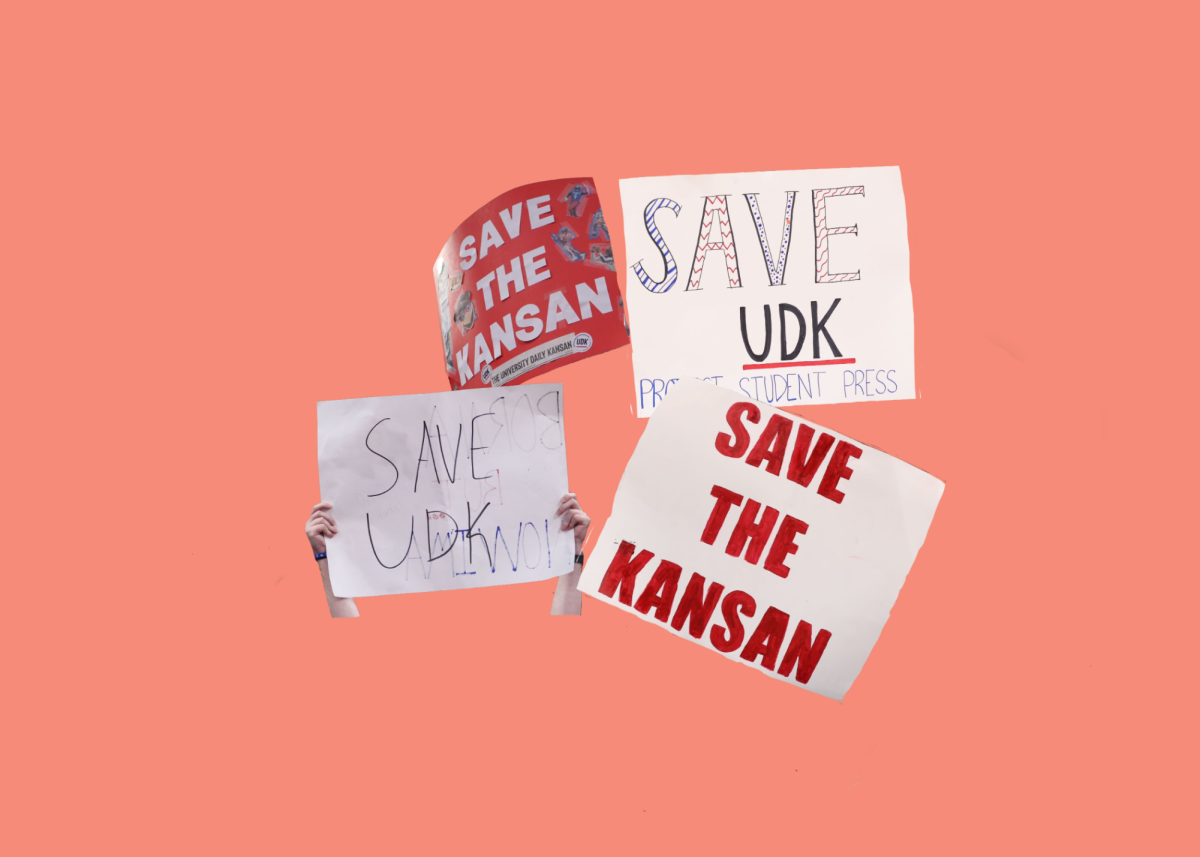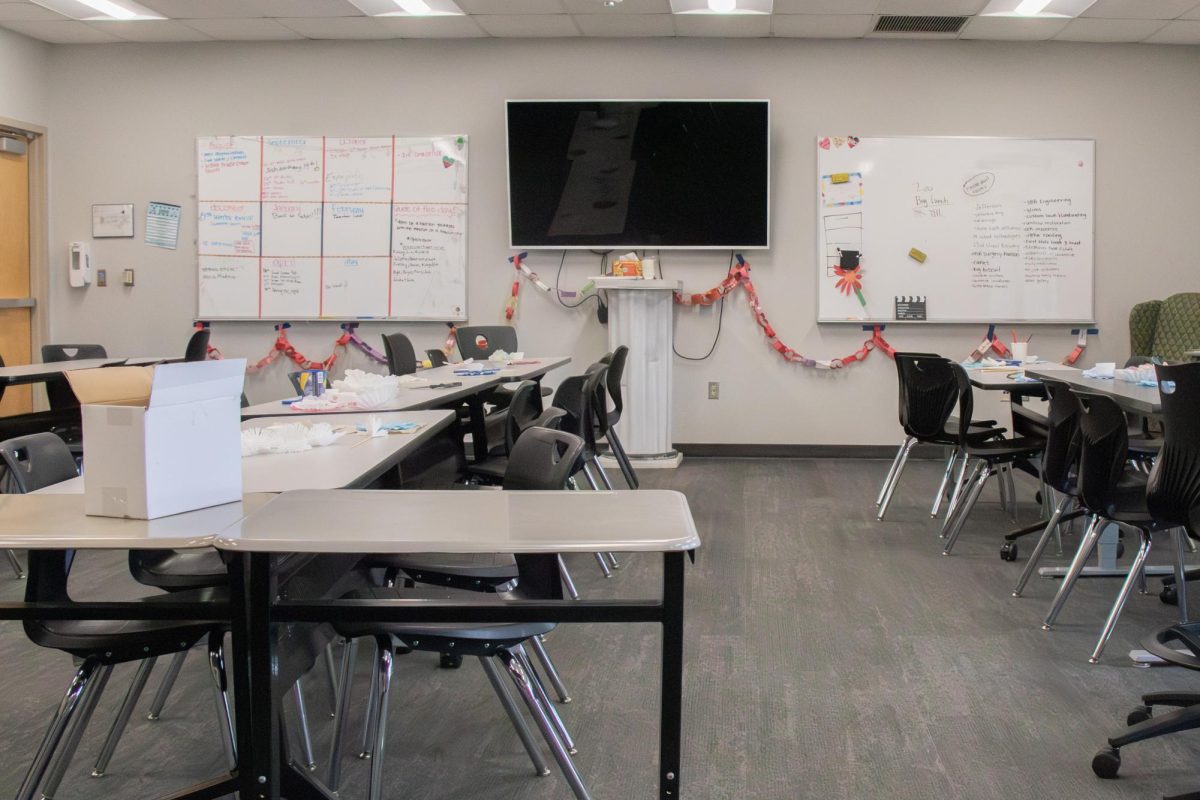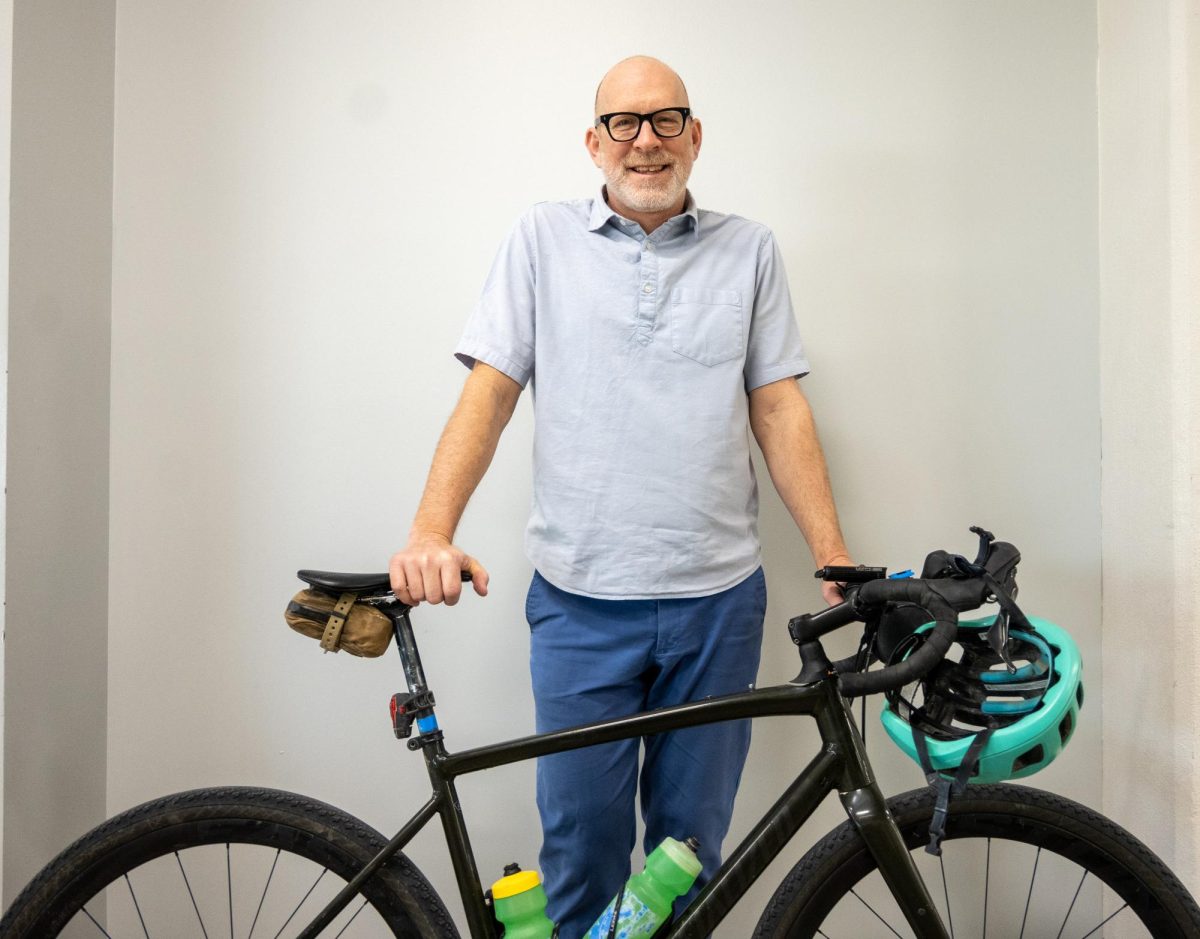When Colombian President Juan Manuel Santos spoke at the Dole Institute of Politics Monday afternoon while visiting his Alma Mater, the University of Kansas, the venue was so packed that perhaps a quarter of the over 500 spectators never had a chance to see him in person.
Those hoping to get good seats at the last minute were disappointed to find themselves in a room just adjacent to the lecture hall, watching the interview on an elevated television. Just a wall away, Santos reminisced about his KU days and spoke about Colombia’s future with Dole Director Bill Lacy.
“I must confess I’m very moved by this experience,” Santos began with a hand over his heart. He was here to accept the Alumni Distinguished Achievement Award, the most prestigious award given by the College of Liberal Arts and Sciences at KU.
Hometown Connection
While Lawrencians of all ages—from college students to senior citizens to one unhappy toddler in a stroller—crowded into the audience to hear Santos speak, at least one Free State student didn’t need to worry about saving herself a seat. As the great-niece of the President, sophomore Isa Santos sat comfortably in the front row.
“[W]e spent all day listening to him talk,” Isa said.
Though she admitted that she didn’t know much about Colombian government before Monday, she feels that she “know[s] a lot” after missing a day of school to submerge herself in her great-uncle’s politics.
Colombia is a long flight south, but Isa’s family occasionally visits her grandfather at his farm, where her great-uncle comes to visit. Because her grandfather is the president’s brother, security guards often accompany them while they are vacationing there.
“When we go to the store and just walk around, they come with us,” she said. “It’s pretty weird….Nobody [in the country] really knows [us], so our security isn’t really obvious.”
This week marked the first time many of Isa’s peers learned of her connection to the Colombian head of state.
“I don’t usually try to make a big deal out of it,” she said. “… They didn’t know, but now they do.”
At Free State, Isa doesn’t feel different from the rest of the students. She lives in the same town, walks down the same halls and takes the same classes–including Spanish.
Unlike her great-uncle, she doesn’t speak Spanish, but she is currently in Spanish III and “would like to speak Spanish eventually.”
Memories of a Jayhawk
Isa’s family has a long history in Lawrence: her great-uncle, grandfather and parents graduated from KU, and her sister is currently studying creative writing as a junior at the university. Before Santos accepted the award, he spoke about his experiences during and after his time in the home of the Jayhawks.
“Lawrence was a small town when I was here,” he said. “It’s grown. The university has grown also, but the fundamentals are still there.”
Santos spent his first year of college at McCollum Hall. Afterward, he joined the Delta Upsilon fraternity, where he “improved [his] ability to play poker.” He invested the money he won from poker games in Pizza Hut, which eventually allowed him to purchase his first car.
Already, he was preparing for his later position as Colombia’s Finance Minister.
Like all college students, however, Santos sometimes had to focus on the here-and-now. Once, he said, while he was chatting with a girl at a party, one of his fraternity brothers saved his life.
“You must leave now,” his friend interrupted.
“Why?” Santos asked.
“This is the girlfriend of the quarterback of the football team.”
Perhaps, too, he was preparing for his future as Defense Minister.
Santos said he did not hold any leadership positions at KU. He was focused on his studies: he received degrees in economics and business.
“I was a common student,” he said, “struggling with my grades, trying to be a good student.”
Climbing to the Top
Santos originally came to KU because of his family’s background in journalism. The Santos family founded the leading Colombian newspaper, El Tiempo, 101 years ago, and after graduating, he went to work for the family news corporation.
He changed courses in his career after a doctor misdiagnosed him with cancer. Before the diagnosis was found false, Santos had time to reflect upon his life, deciding that he didn’t actually want to be a journalist. He wanted to go into public service.
The nation was in the midst of economic and political crises when when Santos entered government service. When he was asked to hold an office, he responded, “In what capacity? What do you want me to do?”
“Whatever you want,” he was told.
When he chose the office of Finance Minister, he said, “Everybody thought I was suicidal. … They used to burn me [in effigy]—burn my picture in every single town in Colombia.”
That sentiment had changed by the time he ran for the presidency in 2010. Santos received the greatest number of popular votes of any candidate in Colombia’s democratic history, with his term ending in 2014.
Colombia Today
As president, one of Santos’ major focuses is on reaching peace with the Revolutionary Armed Forces of Colombia, with whom his nation has been warring for half a century.
“When you fight a war,” he said, “you fight a war for a purpose, not for the sake of fighting.”
The two sides will begin peace talks in two weeks.
Colombia’s other war, the drug war, has also left the country scarred.
“There is no other country that has suffered more,” Santos said. He has convinced allied nations to discuss possible alternatives to the current strategy at a later date, and just last week, Colombia caught up to the country’s last big drug lord.
Economically, Colombia is “growing very fast,” Santos said. He cited an average growth rate of 4.9 percent and several vital resources, including a young population, energy, biodiversity, land and water.
Like the United States, however, Colombia also possesses “tremendous inequalities.” Santos hopes to help lift the poorest segments of the population out of poverty.
He values the ability of education to help achieve that goal.
“Education is something that is so fundamental to any [nation’s] development,” he said.
Earlier in his term, Santos signed into law a bill providing free primary and secondary education to every Colombian. The nation also provides free post-secondary education programs, but not enough to accommodate all young adults. Some students go on to private universities, but, as in the United States, this can carry a heavy financial burden.
On the whole, however, Santos is optimistic about his nation’s progress and its future.
“Colombia is a rising star,” he said, “and what we need is investment, because that’s what creates jobs and what brings us prosperity.”









